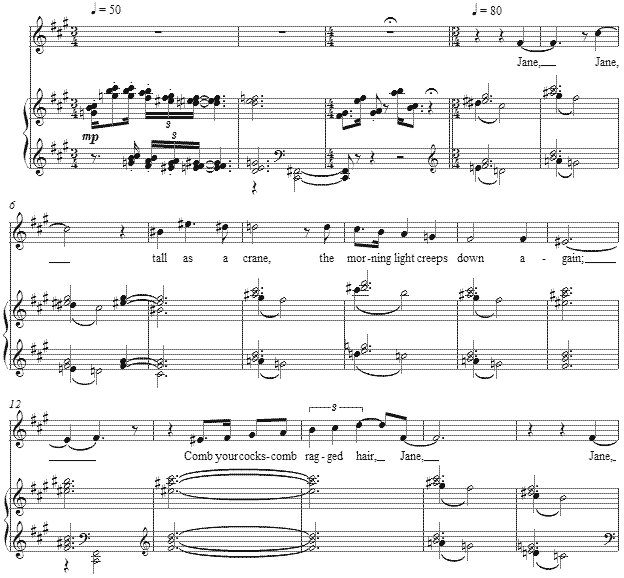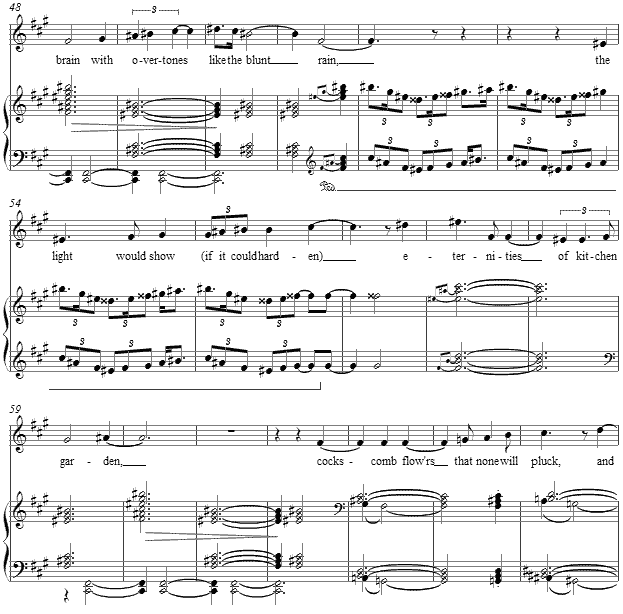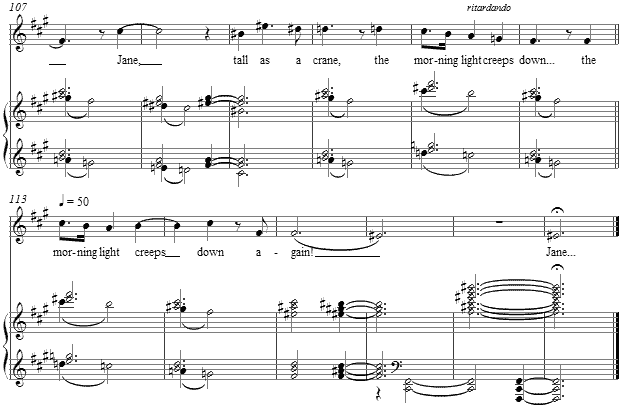Music and Texts of GARY BACHLUND
Vocal Music | Piano | Organ | Chamber Music | Orchestral | Articles and Commentary | Poems and Stories | Miscellany | FAQs
Aubade - (2009)
Edith Sitwell
for mezzo soprano and piano
Jane, Jane
Tall as a crane,
The morning light creaks down again;
Comb your cockscomb-ragged hair,
Jane, Jane, Come down the stair.
Each dull blunt wooden stalactite
Of rain creaks, hardened by the light,
Sounding like an overtone
From some lonely world unknown.
But the creaking empty light
Will never harden into sight,
Will never penetrate your brain
With overtones like the blunt rain,
The light would show
(if it could harden)
Eternities of kitchen garden,
Cockscomb flowers
that none will pluck,
And wooden flowers
that 'gin to cluck.
In the kitchen you must light
Flames as staring, red and white,
As carrots or as turnips, shining
Where the old dawn light lies whining
Cockscomb hair on the cold wind
Hangs limp,
turns the milk's weak mind...
Jane, Jane,
Tall as a crane,
The morning light
creaks down again![ 5 pages, circa 4' 45" ]
Edith Sitwell
Edith Sitwell (1887-1964) was a British author, poet, biogrpaher and literary critic, who began her writing career with a poem published in the Daily Mirror in 1913. An innovator in poetry at the beginning of the 20th century, she both gave and received harsh criticism of other contemporary poets. Eclectic, even odd, in her life style and dress perhaps as complaint against her aristocratic lineage, she gave many public readings of her poetry, including those with music by her colleague of that time, William Walton. She did not marry, though she made poet Dylan Thomas her protégé. She received a Royal Society of Literature medal in 1933 and DBE in 1954. In 1955 she converted to Roman Catholicism. Throughout the remainder of her life, she continued her writing and readings.
Originally published as "Aubade", from Saturday Westminster Gazette, October 1920, the title in French might be understood both as a "serenade to morning," but also a "serenade of morning." Jane, the character Sitwell describes, greets the dawn unwillingly, perhaps begrudgingly. The images are angular, if not tinted with small anger. "Tall as a crane" suggests something of a personal confession for Sitwell herself was six feet tall as well as angular in body.
The opening gesture comes from the rhythmic shape of a rooster's crow which I have heard many times, as the announcement of dawn. The harmonic gestures are consistently polytonal, the upper voices a minor seventh above the lower voices as the suspensions release into continuing dissonances. Only at measure 12 and in similar instances following does the "dawn" become more consonant in its major eleven tonic chords, a call for and glimmer of loveliness before the return to the more dissonant polytonal vocabulary of the setting.
The dotted triplet gestures outlining the tonic eleven and some lower neighbor notes speak of the rain of which Sitwell adds into the atmosphere of the text and its images.
The text repeats the opening lines at its end, and so I add again a reprise of the musical setting to Sitwell's reprise as "the morning light creeps down again" is accompanied by the falling vocal line in echo of this sentiment and the character's experience in her "morning serenade."
The score for Aubade is available as a free PDF download, though any major commercial performance or recording of the work is prohibited without prior arrangement with the composer. Click on the graphic below for this piano-vocal score.



